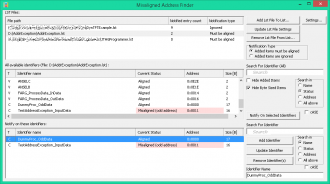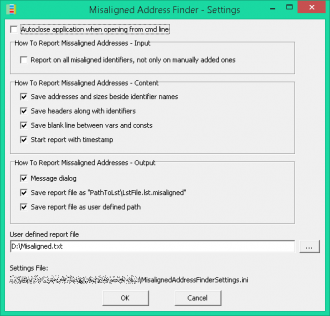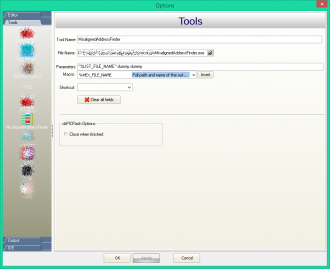
We strongly encourage users to use Package manager for sharing their code on Libstock website, because it boosts your efficiency and leaves the end user with no room for error. [more info]

Rating:
Author: VCC
Last Updated: 2020-06-05
Package Version: 1.1.0.2
Category: Other Codes
Downloaded: 310 times
Not followed.
License: MIT license
Misaligned Address Finder is a tool used to generate a report on variables and constants, which are not Word or DWord aligned.
Some variables / constants are required to be allocated at even addresses (16-bit architectures) and at multiple by 4 addresses (32-bit architectures), so users can be notified about that allocation.
Do you want to subscribe in order to receive notifications regarding "Misaligned Address Finder" changes.
Do you want to unsubscribe in order to stop receiving notifications regarding "Misaligned Address Finder" changes.
Do you want to report abuse regarding "Misaligned Address Finder".
| DOWNLOAD LINK | RELATED COMPILER | CONTAINS |
|---|---|---|
| 1591378900_misaligned_addre_other_pic24.zip [589.04KB] | Other PIC24 Compilers |
|
Misaligned Address Finder is a tool used to generate a report on variables and constants, which are not Word or DWord aligned. Some variables / constants are required to be allocated at even addresses (for 16-bit architectures) and at “multiple by 4” addresses (32-bit architectures), so users can be notified if the compiler doesn’t do that allocation as required. This is to avoid running into address exceptions when working with misaligned pointers. See forum topic
Features:
- It is started from a mikro compiler as a tool
- Uses the compiler generated lst file as input, to get the list of identifiers (variables / constants)
- Keeps track of multiple lst files (added by user)
- Notifies either about all misaligned identifiers or about a user-defined subset of all identifiers
- Notifies through a message dialog or through two different generated report files
- The report verbosity is controlled by various application settings
- The application settings are stored in a separate ini file than the list of lst files
- The two applications settings files can be passed as command line arguments, if desired
- The application can be part of an automation environment
Requirements / Recommendations:
- The application must be run with "%LIST_FILE_NAME" parameter from compiler's IDE, including quotes.
- Be careful of what files are passed as command line arguments, because the second and the third arguments are expected to be ini files and they will be overwritten while closing the application.
- An IDE bug deletes the quotes from LIST_FILE_NAME parameter, so there must be at least two parameters, which are correctly saved: "%LIST_FILE_NAME" dummy The second one has no quotes and is ignored by the application.
Limitations:
- Neither the list of files nor the lists of identifiers can be sorted.
- No misaligned identifier will be reported by default. Users have to either add them to the list (manually),
or to set the application to report on all misaligned identifiers.
- When configured to autoclose, the application will have to be started without command line arguments to allow UI interaction.


